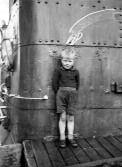Like most people, I think my generation was the best era to grow up in. Being a post-war baby, I can’t recall rationing etc. From an early age, time was spent in and around the shore, exploring rock pools and seasonal things such as caring for gulls that had fallen out of their nests, helping in local maltings, playing conkers both with the tangles and chestnuts, scraping for money at East Beach (when sand has shifted with storms, coins can be found between stones), going up the castle to the coastguard hut with my father’s flask and sandwiches (my father was auxiliary coastguard). Adventures along to the Vaults and [the] lookout hut above the golf club whose practice area was the venue for most fisher folk’s Easter picnic: the annual trek with prams, kid’s bats and balls for various team games etc. to roll their Easter eggs. Ossie Dean; Hidden Valley (Belton estate); Spike and Duck Island were other places to explore.
The Sunday school also played an important part in my young life, with annual train trips to faraway places like East Linton and Longniddry or [a] bus trip to Gifford. Santa in [the] church hall. Going to the big church. Also the Hallelujahs for gospel meetings on East Beach in the afternoons, and evenings at the harbour. Car trips with [the] family in and around the countryside, walks round prom and Larch Park, frog spawn in the spring, and playing deserters in the early nights.

There were plenty small jobs for making pocket money, as the small trader was still very much in evidence, delivery boys were needed for the bakers, grocers, butchers and newsagents. I myself was paperboy for H. Ross and then message boy for Grahame baker’s and grocer shop, who supplied the pies to the local junior football team who had just won the Scottish Cup in 1960-61, thereafter following the team both home and away. I also helped the row-boat hirers; the local maltings was another place for adventure, then on to attend and look after ‘Sinbad‘ the Episcopal minister’s sailing dingy. With many local sailing trips for picnics, and in the winter months, table tennis and billiards at the rectory. The cafe also played a part in whiling away the hours, also the amusement arcade with fruit machines, jukebox and monkeys. The travelling fair was looked forward to as well, as I worked on the Jungle Ride.
By the time I left school in 1963, Dunbar was starting to boom in the entertainment stakes. Mr Cairns Boston was appointed publicity officer and in the years that followed there was introduced vintage car rally, stockcar racing, wrestling, cabaret dancing both in [the] Victoria and Pool ballrooms; treasure hunts and beauty contests; putting, pony trekking, scooter rallies, pipe band contests and some I’ve forgotten.
Even the BBC got in on the act with televising ‘It’s a Knockout’ (an international inter-town competition). Most of the summer was spent down at the swimming pool, and of course the cinema. Saturday mornings were matinee – with Flash Gordon and Ming the Mighty. Evenings had a change of full-length feature films every other night.
Heady days.
Gordon Easingwood has been a fisherman in Dunbar for the last 40 years; he still fishes for crabs and lobsters from his boat Fisher Lassie.